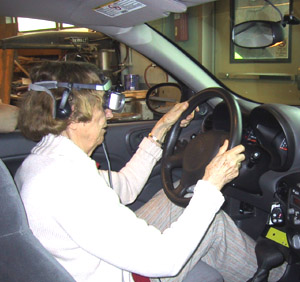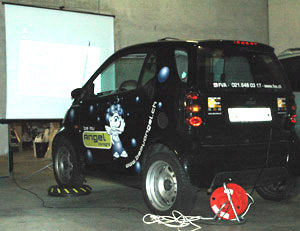Driving Simulators for Rehabilitation, Aging and Human Factors Research
Rehabilitation, Elderly Drivers

We have developed a low-cost, portable driving simulator for evaluation and advisement that, permits an individual to drive his or her own vehicle within the simulator’s virtual universe, and to do so at a location of familiarity and comfort.
The Drive Square Simulation System™ enables three important benefits:
- greater face validity of the simulation (due to the use of the individual's personal vehicle), an often overlooked constraint to an older individual’s acceptance of the simulation and the lessons learned from its use
- transfer of results to “real world” driving since the identical vehicle is used
- true portability, leading to enhanced utility because the simulator can be readily moved between locations. This enables outreach to individuals who might be reluctant to visit a remote or unfamiliar location or who might be concerned about the loss of privacy and the risk of official oversight that visiting such a facility might entail
Because of these features, and because the simulator includes suitable visual, auditory and haptic feedback, data collection and analysis capability, and immediate feedback of results, this technology can be especially useful to organizations whose mission includes health care, outreach, and assistance in maintaining an independent lifestyle for the elderly.
Using a Head-Mounted Display (HMD) the driver has an ability to see 360 degrees by turning the head. However if an HMD use is undesirable, the Drive Square Simulation System can be used with the following alternative screen configurations:
- 1 or 3 flat screens set up on a dashboard inside a car (whenever portability is important)
- Some of our customers also use 1 or 3 large projection screens in front of the vehicle (for laboratory set-up)
With either configuration we recommend using Adiona™ or STISIM simulation engine for easy driving scenario design and modification.
Human Factors Research

Since the simulator is portable and easy to set up anywhere, it can be brought to your subjects, instead of asking them to come to a research facility.
This can reduce problems with human subject recruitment, especially among the elderly. They will not need to drive after the experiment, which alleviates some of the typical IRB concerns in this area.
Portability also means that you can have a larger sample size and obtain more conclusive results. Since you can employ several driving simulators simultaneously at different locations you will have access to a larger pool of people and gather measurements quicker.
The joint research project between Drive Square and University of Massachusetts (UMASS),
sponsored by the National Institute on Aging (NIH / NIA Grant 1 R43 AG022777-01) produced a number of papers [1-5] with regard to advisement for aging drivers.
Romoser et al [3] won an honorable mention award at the Driver's Assessment Conference ‘05.
Our work on younger drivers in cooperation with UMASS, sponsored by National Center for Injury Prevention and Control (NIH / CDC / NCIPC Grant 1_R43_CE000200-01) resulted in the
dissertation by Frank Diete [6].
A shorter Power Point presentation
Reference
- Romoser, M., Fisher, D.L., Mourant, R.R., Wachtel, J., Sizov, K.A., Kennedy S.I., Andra, M. (2005). Use of
Driving Simulator to Assess Older Adults’ Critical Driving Skills, Paper No. 05-0589. 84th Annual Meeting of
the Transportation Research Board, January.
- Romoser, M., Fisher, D.L., Mourant, R.R., Wachtel, J., Sizov, K.A., Kennedy S.I., Andra, M. (2005). Use of
Driving Simulator to Assess Older Adults’ Critical Driving Skills, Transportation Research Record, TRB,
Washington, DC. In press.
- Romoser, M., Fisher, D.L., Mourant, R.R., Wachtel, J., Sizov, K.A. (2005). The Use of a Driving Simulator to
Assess Senior Driver Performance: Increasing Situational Awareness through Post-Drive One-on-One
Advisement, 3rd International Driving Symposium on Human Factors in Driver Assessment Training, and
Vehicle Design, June 27-30, Rockport, ME.
- Wachtel, J., Sizov, K.A., Fisher, D.L., Mourant, R.R., Crean, C. (2005). Future Simulation Technology for
Future Safety Demands in the Truck and Bus Industries. Truck and Bus Safety Future Research
Conference, Washington, DC, March 23,24.
- Wachtel, J., Romoser, M., Fisher, D.L., Sizov, K.A., Mourant, R.R. (2005). The Potential to Enhance Older
Drivers’ Critical Driving Skills Through Simulator-Based Advisement. Driver Behavior and Training
Conference, Scotland, November.
- Diete, F. (2008). Evaluation of a Simulator Based, Novice Driver Risk Awareness Training Program.
Master Thesis UMASS, Amherst, February.
For additional inquiries:
e-mail: ksizov@drivesquare.com or
call 1-617-762-4013 x.111

